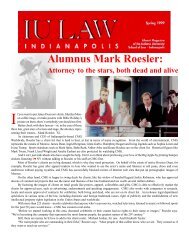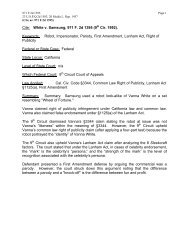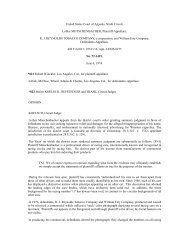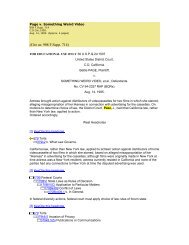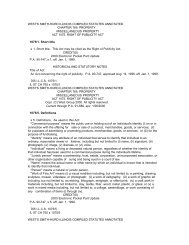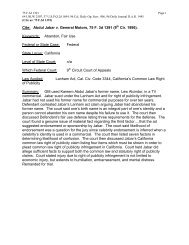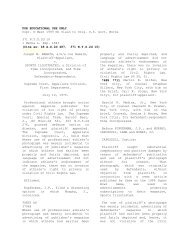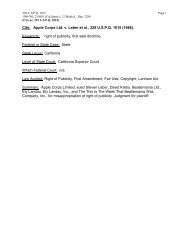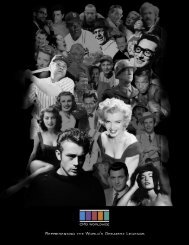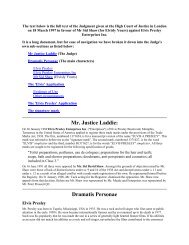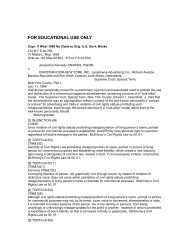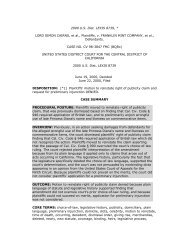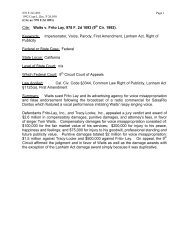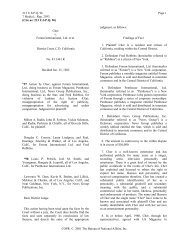Hustler v. Falwell.pdf - Mark Roesler
Hustler v. Falwell.pdf - Mark Roesler
Hustler v. Falwell.pdf - Mark Roesler
You also want an ePaper? Increase the reach of your titles
YUMPU automatically turns print PDFs into web optimized ePapers that Google loves.
to<br />
Speak From Times to Time: First Amendment Theory Applied to Libel and<br />
Misapplied<br />
to Privacy (1968) 56 Cal.L.Rev. 935, 949; Emerson, Toward A General Theory<br />
of<br />
The First Amendment (1963) 72 Yale L.J. 877, 878-881.<br />
- - - - - - - - - - - - - - - - -End Footnotes- - - - - - - - - - - - - - - - -<br />
Free speech encompasses the discussion of "all issues about which<br />
information<br />
is needed or appropriate to enable the members of society to cope with with the<br />
exigencies of their period." (Thornhill v. Alabama (1940) 310 U.S. 88, 102 [84<br />
L.Ed. 1093, 1102, 60 S.Ct. 736].) Participation in the process of<br />
self-government requires knowledge of more than current events and political<br />
candidates. The information required to establish basic values and to order<br />
political priorities is essential.<br />
[*867] Freedom of expression also encompasses the manner in which the<br />
ideas, thoughts and beliefs are expressed. n8 The epigram as well as the<br />
philosophical treatise, the dispassionate analysis as well as the<br />
emotion-charged tirade, may be communicated. (See Cohen v. California, supra,<br />
403 U.S. 15; Good Government Group of Seal Beach, Inc. v. Superior Court<br />
(1978)<br />
22 Cal.3d 672, 689-690 [150 Cal.Rptr. 258, 586 P.2d 572] (dis. opn. of Bird,<br />
C.J.).) To limit how one speaks not only impedes self-expression but diminishes<br />
the public dialogue so essential to a free people.<br />
- - - - - - - - - - - - - - - - - -Footnotes- - - - - - - - - - - - - - - - - -<br />
n8 It is noteworthy that the California Constitution provides that "[every]<br />
person may freely speak, write and publish his or her sentiments on all subjects<br />
. . . . ." (Art. I, @ 2.) As Webster confirms, "sentiments" encompasses not only<br />
thoughts but the attendant emotions. (Webster's New Internat. Dict. (2d ed.<br />
1941) p. 2280.)<br />
- - - - - - - - - - - - - - - - -End Footnotes- - - - - - - - - - - - - - - - -<br />
Our courts have often observed that entertainment is entitled to the same<br />
constitutional [**459] [***357] protection as the exposition of ideas.<br />
n9 That conclusion rests on two propositions. First, "[the] line between the<br />
informing and the entertaining is too elusive for the protection of the basic<br />
right. Everyone is familiar with instances of propaganda through fiction. What<br />
is one man's amusement, teaches another doctrine." (Winters v. New York<br />
(1948)<br />
333 U.S. 507, 510 [92 L.Ed. 840, 847, 68 S.Ct. 665].) Second, entertainment, as<br />
a mode of self-expression, is entitled to constitutional protection irrespective<br />
of its contribution to the market-place of ideas. "For expression is an<br />
integral part of the development of ideas, of mental exploration and of the<br />
affirmation of self. The power to realize his potentiality as a human being<br />
begins at this point and must extend at least this far if the whole nature of<br />
man is not to be thwarted. [ para. ] Hence suppression of belief, opinion and<br />
expression is an affront to the dignity of man, a negation of man's essential<br />
nature." (Emerson, supra, 72 Yale L.J. at p. 879.)<br />
PAGE 47



